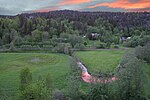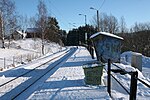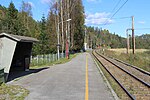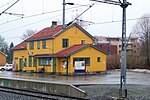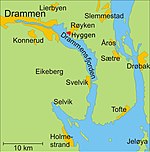Røyken Station
1872 establishments in NorwayNorwegian railway station stubsRailway stations in Norway opened in the 1870sRailway stations in RøykenRailway stations on the Spikkestad Line ... and 1 more
Railway stations opened in 1872

Røyken is a railway station on the Spikkestad Line and is located in Røyken, Norway. The station was opened as part of Drammenbanen in 1872 and was for many years the only railway station in Røyken. The station was located close the old Church in Røyken (from 1229). The station is served by commuter trains to Oslo Central Station and onward to Lillestrøm. The distance to Oslo S is 33 kilometers (21 mi) and the travel time is 45 minutes.
Excerpt from the Wikipedia article Røyken Station (License: CC BY-SA 3.0, Authors, Images).Røyken Station
Klokkergård terrasse, Asker
Geographical coordinates (GPS) Address Nearby Places Show on map
Geographical coordinates (GPS)
| Latitude | Longitude |
|---|---|
| N 59.746666666667 ° | E 10.389722222222 ° |
Address
Røyken
Klokkergård terrasse
3440 Asker
Norway
Open on Google Maps

